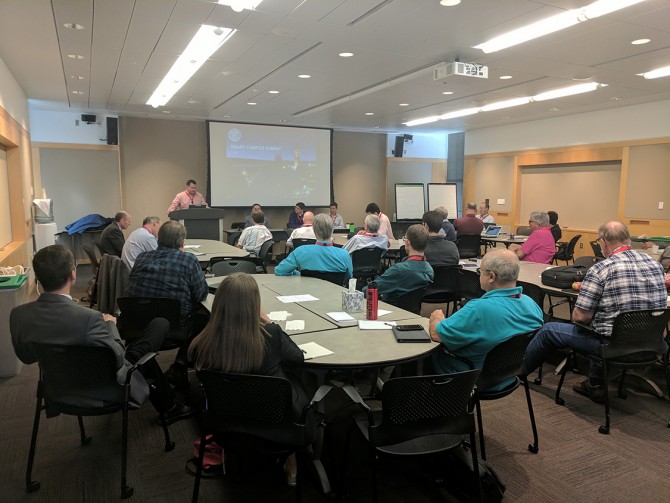Smart Campus Summit: Beyond the Dashboard
More than 50 professionals in information technology and building automation from 13 colleges and universities and seven businesses gathered for the first “Smart Campus Summit: Beyond the Dashboard,” Oct. 2-4.
Hosted by Infrastructure Properties and Planning (IPP), the summit allowed participants to share their collective best practices, learn about the expectations they will face in the near future, and collaborate on how to develop a “smart campus.”
“Campuses such as Cornell’s Ithaca campus present unique challenges and opportunities for building automation systems (BAS) and facilities management professionals,” said Debra Howell, director of IPP Information Technology. Among those challenges: having a wide variety of facilities, both in age and occupancy; multiple generations of building automation equipment; strict and demanding controls for research; and persistent pressure to keep budgets in check, she said.
Among Cornell’s opportunities: well-engaged students, faculty and staff who are more than willing to be pro-active in environmental conservation initiatives. “They are much more inclined to be ‘connected,’ both with their peers and their environment, than ever before,” said Joel Bender, software engineer for IPP. “Colleges and universities are also much more open to collaboration than our corporate counterparts because, while colleges and universities are competing for students, IT staff members are battling the forces of energy cost, infrastructure decay, an explosion of interconnected and dependent devices, and an avalanche of data,” he said.
Summit participants discussed the “Internet of Things,” which promises to usher in "smarter" buildings with more pervasive networks of sensors, tailored to specific types of occupants. By providing their personal data to the BAS, occupants expect the BAS to respond to them just as personally.
At the same time, participants agreed, a growing risk of cyber-attacks to building and access controls systems in facilities threatens the safety of the occupants, the teaching environment and the research being performed. Corporations, colleges and universities need to evaluate the risk to their facilities, find the resources to mitigate them, and prepare for the eventuality that a cyber-attack could occur.
The summit included a dinner presentation from Mike Newman, one of the creators of BACnet; a keynote address by Steve Ray from Carnegie Mellon University; a threat landscape and cyber security panel discussion hosted by Cornell IT Security; a panel discussion by such vendors as Microsoft and IBM; a breakout session by business professionals on what they would like to see from IT for their smart campus; sessions conducted by Cornell and Ivy Plus peers; and a hackathon.
The conference presentations, additional resources, and event photos can be found at: https://ipp.cornell.edu/content/smart-campus-summit-beyond-dashboard.
Media Contact
Get Cornell news delivered right to your inbox.
Subscribe